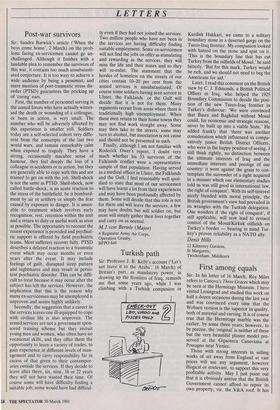LETTERS Post-war survivors
Sir: Sandra Barwick's article (When the boys come home', 2 March) on the prob- lems facing ex-servicemen cannot go un- challenged. Although it finishes with a laudable plea to remember the survivors of this war, it contains too much unsubstanti- ated conjecture. It is too wary to achieve a wide audience by being a pessimist, and mere mention of post-traumatic stress dis- order (PTSD) guarantees the pricking up of 'caring' ears. First, the number of personnel serving in the armed forces who have actually witnes- sed the death or wounding of a colleague, or been in action, is very small. The number who will be adversely affected by this experience is smaller still. Soldiers today are a self-selected cohort very diffe- rent from the conscripts of the last two world wars, and remain remarkably calm when exposed to tragedy. They have a strong, occasionally macabre sense of humour, they feel deeply the loss of a colleague in accidents or in action, but they are generally able to cope with this and are trained to get on with the job. Shell-shock is not the same as PTSD. Shell-shock, now called battle-shock, is an acute reaction to the stress of the battlefield, be it bombard- ment by air or artillery or simply the fear caused by exposure to danger. It is amen- able to treatment which involves early recognition, rest, retention within the unit and a return to duty or useful work as soon as possible. The opportunity to recount the recent experience is provided and psychiat- ric support is offered by field psychiatric teams. Most sufferers recover fully. PTSD describes a delayed reaction to a traumatic event which may occur months or even years after the event. It may include feelings of guilt, disrupted sleep pattern and nightmares and may result in persis- tent psychiatric disorder. This can be diffi- cult to treat because it may occur after the subject has left the services. However, the implication that this is the reason why many ex-servicemen may be unemployed is unproven and seems highly unlikely. Secondly, the suggestion that a career in the services leaves one ill-equipped to cope with civilian life is also unproven. The armed services are not a government spon- sored training scheme but they recruit young men and women, who often have no vocational skills, and they offer them the opportunity to learn a variety of trades, to gain experience at different levels of man- agement and to carry responsibility far in excess of that given to their contempor- aries outside the services. If they decide to leave after three, six, nine, 16 or 22 years they will not have wasted their time. Of course some will have difficulty finding a suitable job; some would have had difficul- ty even if they had not joined the services. Two million people who have not been in the services are having difficulty finding suitable employment. Some ex-servicemen will not find the jobs on offer as stimulating and rewarding as the services, they will miss the life and their mates and so they will re-enlist. The statement that the hordes of homeless on the streets of our cities contain 10-20 per cent from the armed services is unsubstantiated. Of course some soldiers having seen service in Ulster, the Falklands or the Gulf will decide that it is not for them. Many regiments recruit from areas where there is traditionally high unemployment. When these men return to their home towns they may not find work straight away. Some may then take to the streets, some may turn to alcohol, but association is not cause and should not be presented as such.
Finally, although I am not familiar with Roderick Ower's report, I doubt very much whether his 53 survivors of the Falklands conflict were a representative sample of that population. Having served as a medical officer in Ulster, the Falklands and the Gulf, I feel reasonably well qual- ified to state that most of our servicemen will have learnt a lot from their experiences and may have been profoundly affected by them. Some will decide that this role is not for them and will leave the services, a few may have doubts but will soldier on, but most will simply gather their lives together and carry on as normal.
M.J.von Bertele (Major)
4 Regiment Army Air Corps, Operation Granby, BFPO 649


















































 Previous page
Previous page